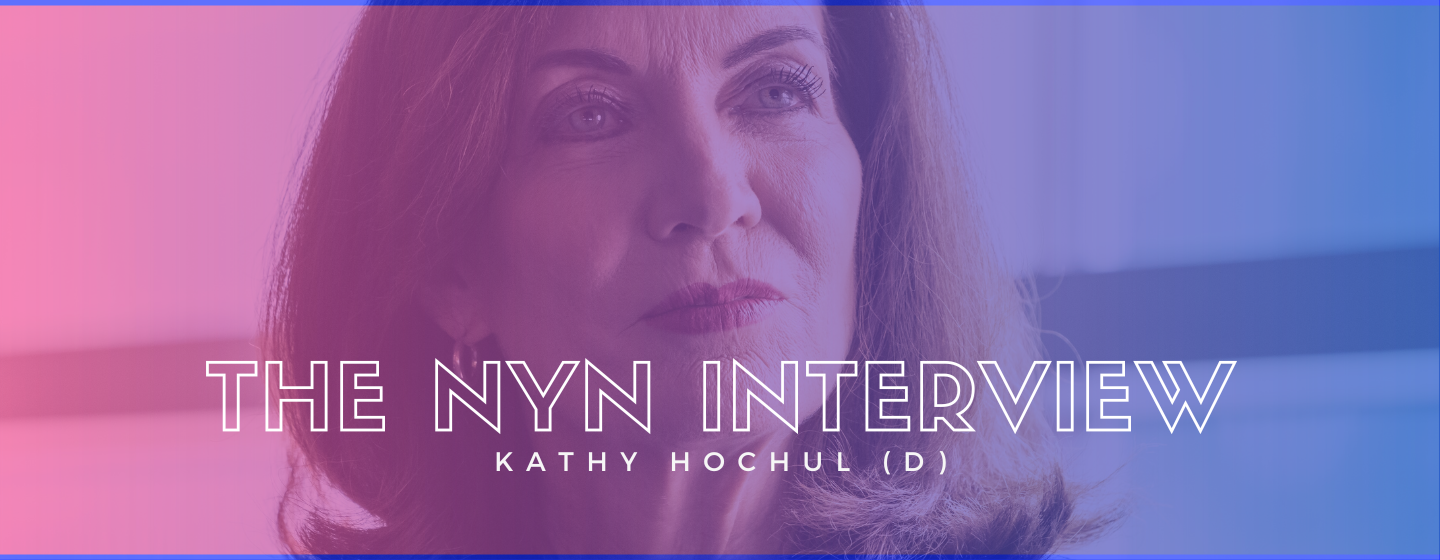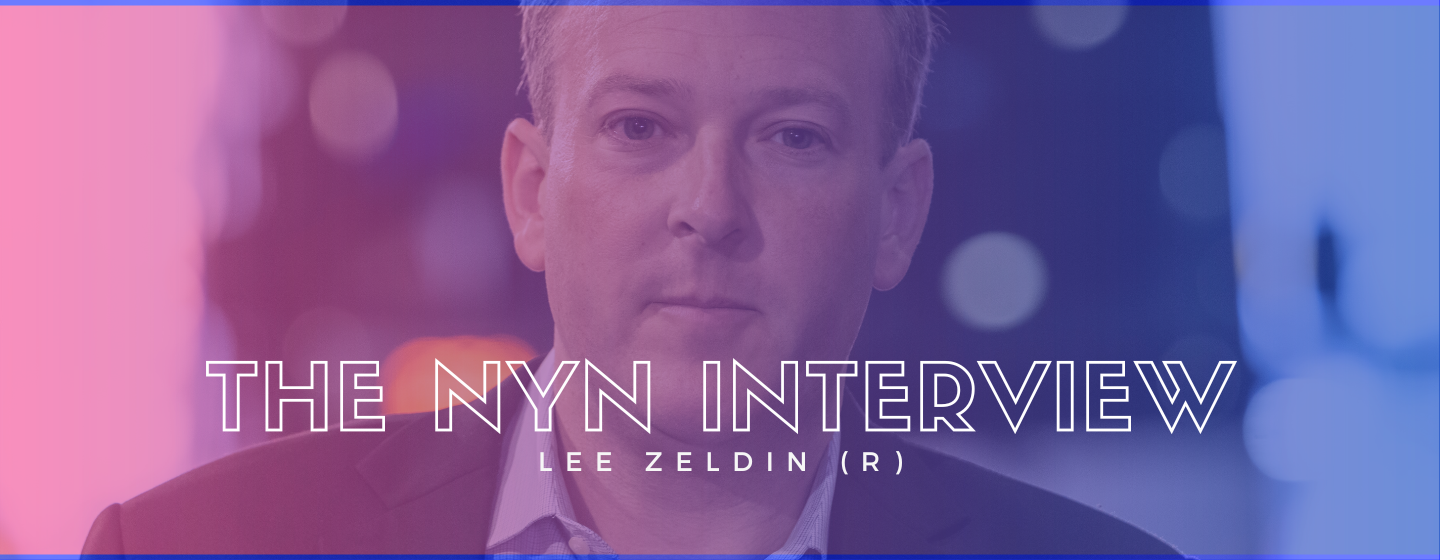Status Update: The Race for New York

With just five weeks until election day, the race for New York's Governor heats up.
Dan Clark interviews Steve Greenberg of the Siena Research Institute.
We are now less than five weeks out from this year's elections, and a new poll has Democrats ahead in races statewide like this year's elections for U.S. Senate and governor. Governor Kathy Hochul has a 17 point lead over Congressman Lee Zeldin, according to the poll.
Certainly independent voters, when an election gets closer, will be very focused on the extreme contrast between two individuals and who is prepared to lead this state into this post-pandemic era. And that person, I believe they'll conclude, is myself based on my experience and a lot more in this week's poll.
We sat down with Steve Greenberg of the Siena Research Institute to see how the polls are trending.
DAN CLARK: Those other that has said internal polling shows a tighter race. But one blind spot for Hochul is with independent voters. Zeldin has a two point lead there and has more support upstate. Hochul responded to that point on Wednesday
So what does this tell us about Kathy Hochul versus Lee Zeldin?
STEVE GREENBERG: Lee has a two point advantage there. But is this race as tight as it usually is around this time for a Democrat versus a Republican in New York? Well, we have to keep it in perspective. New York is a solidly blue state with more than twice as many Democrats as Republicans.
So what we normally see at this time of year, a month, six weeks out from an election, is the Democrats having a sizable lead in this case, not only in the governor's race where Hochul has a 17 point lead over Zeldin right now.
SG: But in the other three statewide races, we see Democrats having leads between 16 and 23 points. So what the Republican has to do, what Zeldin really has to do is he's got to do a better job with independents. He can't just win independents by two or three points. He's got to win independents big if he wants to be competitive in a state like New York and win Democrats, too. I mean, you really have to bring people over to your side of the aisle in a race like this.
| GOV KATHY HOCUL | "Certainly independent voters, when an election gets closer, will be very focused on the extreme contrast between two individuals and who is prepared to lead this state into this post-pandemic era. And that person, I believe they'll conclude, is myself based on my experience and a lot more in this week's poll." |
DC: I have we seen anybody make up this much ground with this short amount of time before Election Day in recent history? It's tough to do and it's tough for a Republican. It's why no Republican has won in New York in two decades since George Pataki won his third term as governor in 2002.
SG: You know, and Zeldin has another problem, which is Republicans right now, he's got the support of 77% of Republicans. 17% of Republicans say they're voting for Hochul. Last month, back in August, I should say, back in August, in the first Siena poll here, Zeldin had the support of 84% of Republicans.
So he's losing Republicans. He's not winning enough among independents and he's not picking off Democrats. I wonder why that. Do you have any insight on why that is? I mean, it's such a strange set of numbers. Well, you know, what we also see here is the traditional gender gap.
Men are basically break even this. They support Hochul by a handful of points, but women, better than 2 to 1, 61 to 29% say they're with Hochul. So in a lot of ways, this is the traditional race we have seen over the last three gubernatorial elections.
DC: The major difference being that there's nobody name Cuomo on the ballot. Is there any anything strange about the other statewide races in terms of the gaps there? It seems like it's all pretty, pretty usual where we would be at this point.
SG: Yeah, it really is. And that's because we have three incumbent Democrats who are running for reelection and their three Republican opponents are largely unknown to the vast majority of voters. So, for example, Joe Pinion, who's running against Chuck Schumer, 88% of voters have never heard of him or don't have an opinion about him.
Same for Paul Rodriguez, who's running against Tom DiNapoli for state comptroller and same for Michael Henry. 92% of voters have never heard or don't know enough about Michael Henry, who's running against Letitia James for attorney general to have an opinion.
So now what we're seeing is sort of a lackluster New York campaign at the statewide level where the Democrats are in control and the Republicans are trying to sneak in, but losing time. You know, meanwhile, I found something very interesting about the issues that voters are now finding important.
DC: So later in the poll, you ask voters what their big issue is in turning their vote in November. And now we see most voters are talking about the economy and crime seems to have gone down a little bit.
SG: I found that really interesting. Absolutely. Look, in the spring. Crime was far and away the number one issue that voters were talking about. Now, when we asked voters the top issue, that's going to determine how they vote in November. And then the second issue, what we find is half of voters have said economic issues is one of their top issues. 30% said it is the top issue. Coming in second now. Threats to democracy. A third of voters say it's one of.
Our top two priorities. 22% say it's their top priority. Crime has dropped down now to third. And then you have your second tier issues that are important to segments of the electorate, but not overall. And that's gun policy, abortion, health care, important to a group of voters, but not necessarily a large group of voters.
And how are we defining threats to democracy? I know that might mean different things to different people. It absolutely does. And we're not defining it. What we ask voters is, is that an important issue for you? And so interestingly, what we see is 35% of Democrats say it's one of their top two issues.
34% of Republicans say it's one of their top two issues. So I think Republicans and Democrats probably come at this from a different point of view. But what is interesting is that you have a sizable number of Republicans, Democrats and independents who are concerned about threats to the country's democracy.
DC: That's fascinating. That is really interesting. And if we see a question like that, again, I would be very interested to see the answer in a couple of years. Steve Greenberg from the Siena Research Institute, thank you so much.





